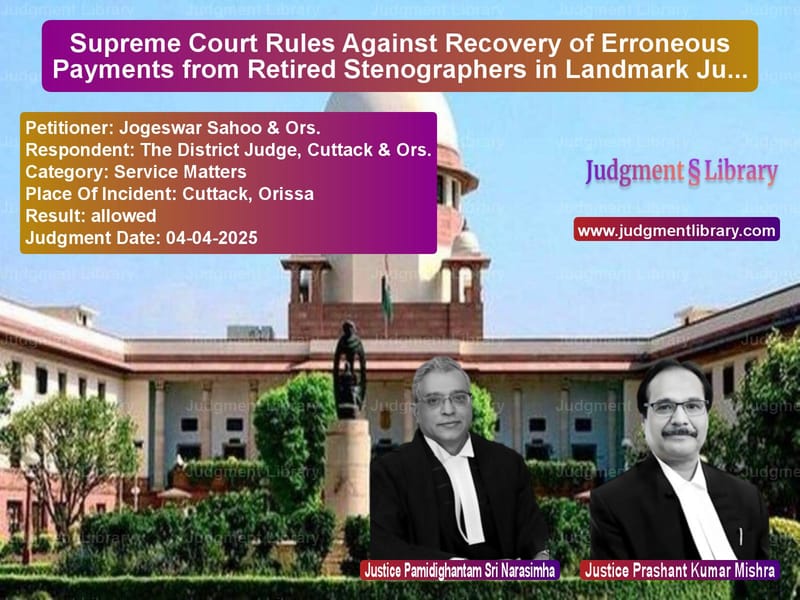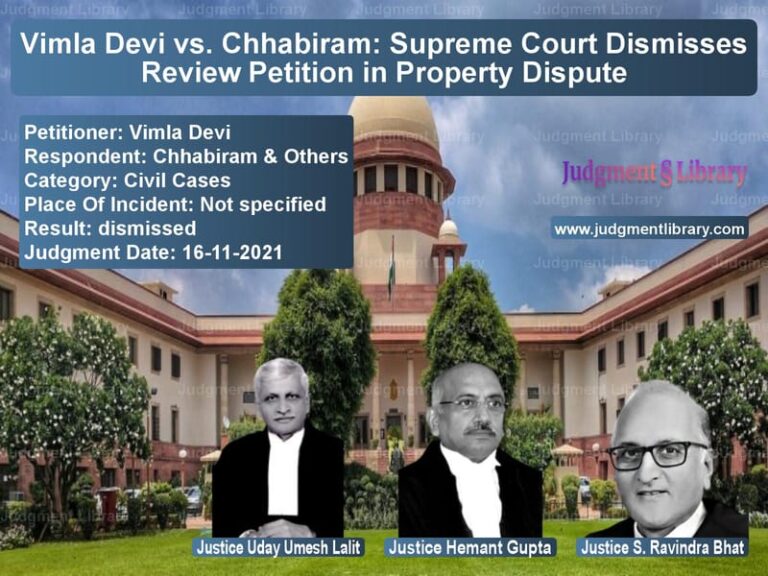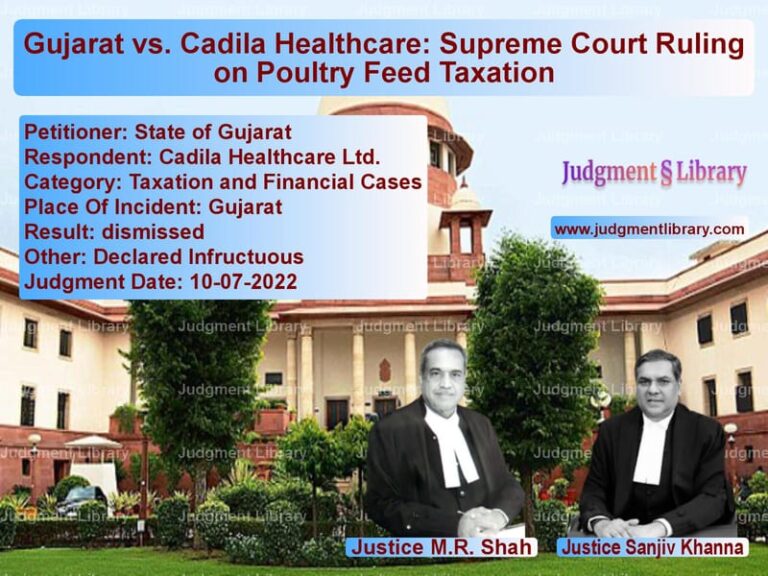Supreme Court Rules Against Recovery of Erroneous Payments from Retired Stenographers in Landmark Judgment
In a significant ruling, the Supreme Court of India delivered a judgment that has far-reaching implications for employees, especially those in lower rungs of government service. The case involved retired stenographers from the District Judiciary in Cuttack, Orissa, who were directed to repay financial benefits they had received years earlier due to an administrative error. The Court’s decision, which came on April 4, 2025, has set a precedent protecting employees from arbitrary recovery of payments made without their fault.
Background of the Case
The appellants, Jogeswar Sahoo and others, were working as Stenographer Grade-I and Personal Assistant in the District Judiciary, Cuttack. In 2017, they were granted financial benefits retrospectively from April 1, 2003, based on the recommendations of the Shetty Commission. These benefits were credited to their accounts via Office Order No. 63 dated May 10, 2017, issued by the District Judge, Cuttack.
However, in 2023, six years after the payments were made and three years after the appellants had retired, the respondents (the District Judge, Cuttack, and others) ordered the recovery of these amounts. The grounds for recovery were that the benefits had been extended due to an erroneous interpretation of the Shetty Commission’s recommendations. The appellants challenged this recovery order in the High Court of Orissa, which dismissed their writ petition. Aggrieved, they approached the Supreme Court.
Arguments of the Petitioners
The appellants’ counsel argued:
- The financial benefits were granted without any fraud or misrepresentation on their part.
- Recovery of the amount after three years of retirement was illegal and arbitrary.
- The High Court failed to consider settled legal principles established in multiple Supreme Court judgments, which prohibit such recoveries from low-paid employees post-retirement.
Arguments of the Respondents
The respondents’ counsel countered:
- The appellants were not entitled to the financial benefits as per the correct interpretation of the Shetty Commission’s recommendations.
- The District Judge’s order granting retrospective promotion and benefits was administrative in nature and affirmed by the High Court.
- The appellants had furnished undertakings agreeing to refund any excess amounts paid, thus estopping them from challenging the recovery.
Supreme Court’s Analysis
The Supreme Court framed the issue as follows:
“The issue falling for our consideration is not about the legality of the retrospective promotion and the financial benefit granted to the appellants on 10.05.2017. The issue for consideration is whether recovery of the amount extended to the appellants while they were in service is justified after their retirement and that too without affording any opportunity of hearing.”
The Court relied on several precedents, including:
Key Judgments Cited
- Sahib Ram vs. State of Haryana (1995): The Court restrained recovery of payments made under an upgraded pay scale due to wrong construction of relevant orders by the authority, without any misrepresentation by the employee.
- Shyam Babu Verma vs. Union of India (1994): Established that excess payments made due to wrong interpretation of rules should not be recovered if there was no fraud.
- Union of India vs. M. Bhaskar (1996) and V. Gangaram vs. Regional Jt. Director (1997): Reinforced the principle against recovery in similar circumstances.
- Thomas Daniel vs. State of Kerala & Ors. (2022): Recent judgment summarizing the law on recovery of excess payments.
The Court particularly emphasized the principles laid down in State of Punjab v. Rafiq Masih (White Washer), which identified specific situations where recovery would be impermissible:
“18. It is not possible to postulate all situations of hardship which would govern employees on the issue of recovery, where payments have mistakenly been made by the employer, in excess of their entitlement. Be that as it may, based on the decisions referred to hereinabove, we may, as a ready reference, summarise the following few situations, wherein recoveries by the employers, would be impermissible in law:
(i) Recovery from the employees belonging to Class III and Class IV service (or Group C and Group D service).
(ii) Recovery from the retired employees, or the employees who are due to retire within one year, of the order of recovery.
(iii) Recovery from the employees, when the excess payment has been made for a period in excess of five years, before the order of recovery is issued.
(iv) Recovery in cases where an employee has wrongfully been required to discharge duties of a higher post, and has been paid accordingly, even though he should have rightfully been required to work against an inferior post.
(v) In any other case, where the court arrives at the conclusion, that recovery if made from the employee, would be iniquitous or harsh or arbitrary to such an extent, as would far outweigh the equitable balance of the employer’s right to recover.”
Court’s Decision
The Supreme Court found that:
- The appellants were not responsible for the erroneous payment.
- They had retired by the time recovery was ordered (in 2020).
- No opportunity of hearing was given before ordering recovery.
- They held non-gazetted, ministerial posts (Stenographers).
- The payment was made in 2017, but recovery was ordered six years later in 2023.
The Court concluded:
“For the aforestated, we are of the considered view that the appeal deserves to be allowed. Accordingly, we allow the appeal and set aside the order of the High Court and in consequence the orders dated 12.09.2023 and 08.09.2023 by which the appellants were directed to deposit the excess drawn arrears are set aside.”
Implications of the Judgment
This judgment reinforces the protection available to employees, particularly those in lower positions, against recovery of payments made due to administrative errors. The Court’s emphasis on equity and preventing hardship to employees who have no fault in such matters sets an important precedent. It also highlights the importance of following due process before ordering recoveries.
The ruling serves as a reminder to employers, especially government departments, to exercise caution in implementing recovery orders, particularly when the employees involved are retired or nearing retirement, and when the payments were made without any misrepresentation on the employee’s part.
Petitioner Name: Jogeswar Sahoo & Ors..Respondent Name: The District Judge, Cuttack & Ors..Judgment By: Justice Pamidighantam Sri Narasimha, Justice Prashant Kumar Mishra.Place Of Incident: Cuttack, Orissa.Judgment Date: 04-04-2025.Result: allowed.
Don’t miss out on the full details! Download the complete judgment in PDF format below and gain valuable insights instantly!
Download Judgment: jogeswar-sahoo-&-ors-vs-the-district-judge,-supreme-court-of-india-judgment-dated-04-04-2025.pdf
Directly Download Judgment: Directly download this Judgment
See all petitions in Employment Disputes
See all petitions in Pension and Gratuity
See all petitions in Public Sector Employees
See all petitions in Termination Cases
See all petitions in Judgment by P.S. Narasimha
See all petitions in Judgment by Prashant Kumar Mishra
See all petitions in allowed
See all petitions in supreme court of India judgments April 2025
See all petitions in 2025 judgments
See all posts in Service Matters Category
See all allowed petitions in Service Matters Category
See all Dismissed petitions in Service Matters Category
See all partially allowed petitions in Service Matters Category







